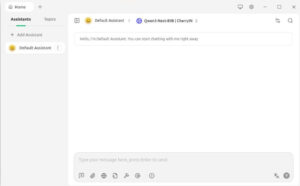The open-source file hosting platform that recently added generative AI to its mixture of offerings, is now working with the German state of Schleswig-Holstein to come up with LLMs that can be locally hosted and are focused on the needs of governments.

When Nextcloud Hub 6 was released last week, one of its most notable features was in it’s fine grained integration of generative AI. The platform’s use of AI is intended to bring the entire process of processing AI to the local level, so that users can take advantage of AI’s promises without having to turn their data over to third-party providers.
The folks at Nextcloud have done a good job with this so far, but there is still work to be done to make this idea a reality.
The good news is that government is getting involved with Nextcloud’s efforts — and in a good way. On Friday, the folks at Nextcloud and the German state of Schleswig-Holstein announced that the two entities are now collaborating, with the purpose of developing open, trustworthy solutions for the growing demand for AI applications at the governmental level.
“In the future, we will make AI services available to colleagues in the state administration directly at the workplace,” Dirk Schrödter, Schleswig-Holstein’s digitization minister (yes, they evidently have such things in Germany) said in a statement. “We want to drive the development of digitally sovereign and open solutions, in addition to the use of existing AI services such as ChatGPT. The administration of the future will work in an automated, algorithmized, cloudified, and data-based way. To make this vision of the future a reality, we must provide the appropriate tools.”
Nextcloud’s Move Into Generative AI
For those who don’t know, Nextcloud is an open-source platform that enterprises can use to (among other things) build portals for customers, employees, or both. It has all of the bells and whistles that any company that aspires to join the Fortune 500 expects, and it hits all the web portal bullet points, from document collaboration to virtual meetings. What’s quite impressive about Hub 6 is the amount of AI it brings to the table — especially when considering that Nextcloud is pretty much still a an open-source startup, and generative AI pretty much remains a big boys domain, controlled by the likes of Google and Microsoft.
In Nextcloud Hub 6, users can take advantage of built-in open-source large language models that are integrated into the platform’s AI Assistant to do things like summarize, translate, or reword texts; summarize email threads; transcribe video calls; create project plans; and more. One of the features I’d like to have at my fingertips is its ability to take texts written in a formal, staid, and boring formal style and turn them into something more conversational and easy to read, which is a large part of what I do.
For the next step on this journey, Nextcloud plans to develop LLMs that are focused on specific domains that includes the needs of governments, and given the company’s previous work with Schlesqig-Holstein, it’s not surprising that the two entities have joined forces at this early stage. Nextcloud says that its hoping to build language models that “will be able to help write specific government documents, answer questions about state processes, and so on, in the style and language used in the government.”
Issues to Overcome
The issues involved in this process go far beyond just teaching a language model to mimic the “style and language” of government, but go to addressing problems that have been endemic to not only generative AI but to AI in general. This largely has to do with security or leaks, which are officially recognized issues on both sides of the Atlantic, to digital sovereignty which is a much larger issue in the EU where member countries are much smaller geographically than the U.S. — and with many countries having their own stringent data sovereignty laws.
Negatively affecting both issues: current solutions to enable AI to access a large amount of documents in order to answer questions or generate content quickly, require large amounts of data to pass through third-party AI providers. As Jos Poortvliet, the marketing director at Nextcloud said in a blog posted on Friday: “This creates unacceptable risks for the digital sovereignty and security of government data. A digitally sovereign AI is needed.”
Nextcloud is already moving in that direction. For example, Hub 6’s AI Assistant offers a variety of open-source LLMs, some of which can be run locally, from within users own instances of Nextcloud. More importantly, perhaps, the platform also makes available ethical AI ratings, which provide users information on the privacy and data sovereignty implications of the various LLM options.
Moving forward, Nextcloud and Schleswig-Holstein plan to create a generative language model for the state government that will be specifically adopted to meet the requirements of government administrative texts. This being Nextcloud , the model they come up with will be available under an open-source license, which means that when the dust settles it’s not only Nextcloud, Schleswig-Holstein, and Germany that stands to gain from this collaboration — it could be coming soon to an open city near you.
“Schleswig-Holstein and Nextcloud recognize that Europe needs reliable AI technology that protects Europe’s economic and digital sovereignty,” Frank Karlitschek, Nextcloud’s founder and CEO said. “Our strategic initiative will lead to the first AI technology that can deliver insights based on sensitive government data, without the risk of third-
party access.”
As Rachel Maddow would say: Watch this space.
Christine Hall has been a journalist since 1971. In 2001, she began writing a weekly consumer computer column and started covering Linux and FOSS in 2002 after making the switch to GNU/Linux. Follow her on Twitter: @BrideOfLinux








